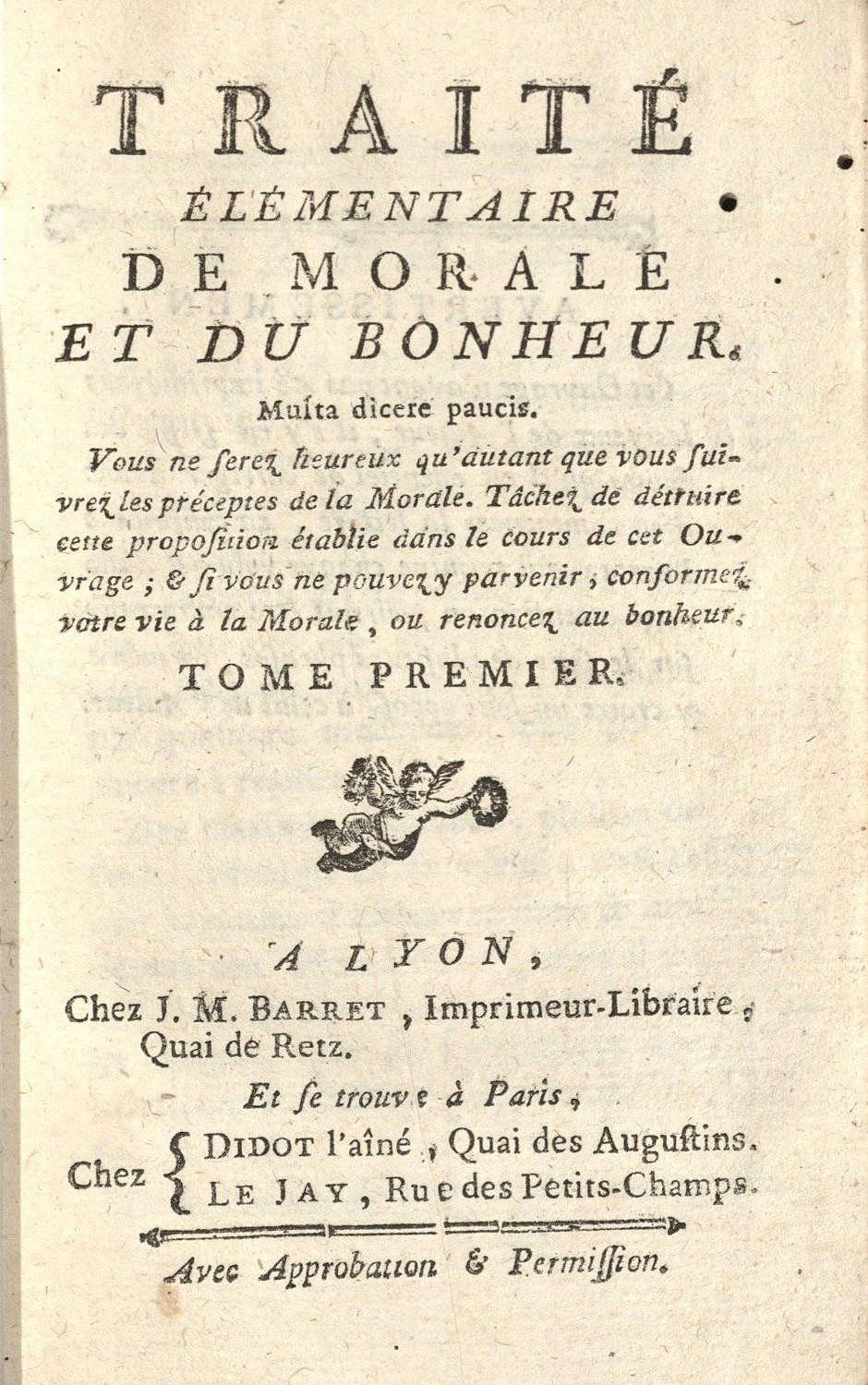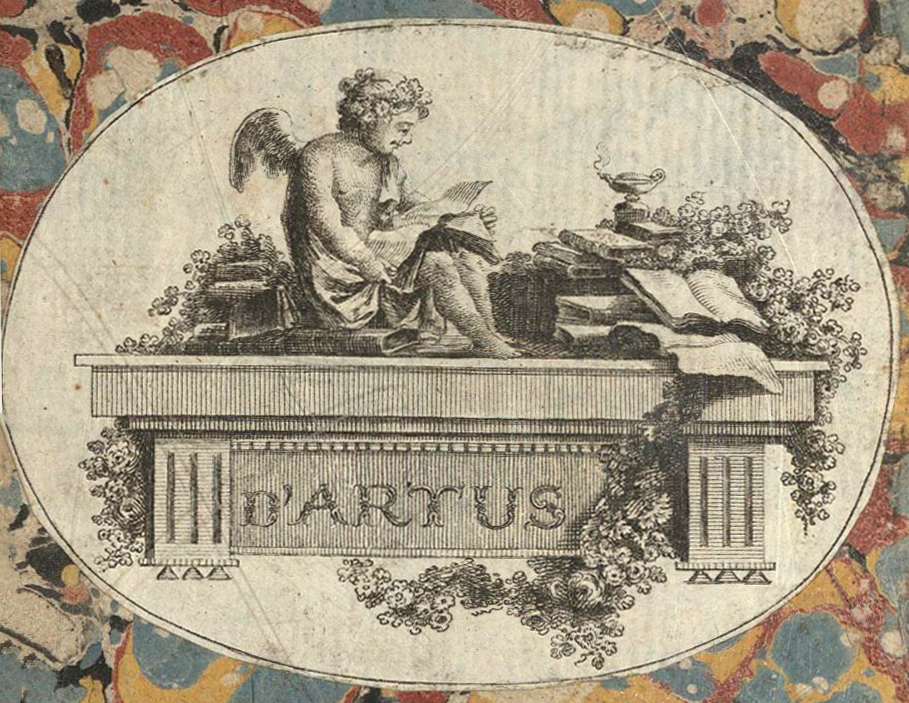Difference between revisions of "Traité Élémentaire de Morale et du Bonheur"
m (→Description of the Wolf Law Library's copy) |
m |
||
| (4 intermediate revisions by the same user not shown) | |||
| Line 29: | Line 29: | ||
==Evidence for Inclusion in Wythe's Library== | ==Evidence for Inclusion in Wythe's Library== | ||
| − | Listed in the [[Jefferson Inventory]] of [[Wythe's Library]] as "Morale et Bonheur. p.f." [[Thomas Jefferson]] gave Wythe's copy of | + | Listed in the [[Jefferson Inventory]] of [[Wythe's Library]] as "Morale et Bonheur. p.f." [[Thomas Jefferson]] gave Wythe's copy of "Traité Élémentaire de Morale et du Bonheur" to his grandson [[Thomas Jefferson Randolph]]. The precise edition owned by Wythe is unknown. [http://www.librarything.com/profile/GeorgeWythe George Wythe's Library]<ref>''LibraryThing'', s.v. "[http://www.librarything.com/profile/GeorgeWythe Member: George Wythe]," accessed on June 22, 2015.</ref> on LibraryThing indicates the 1784 edition published in Lyon. The [https://digitalarchive.wm.edu/handle/10288/13433 Brown Bibliography]<ref>Bennie Brown, "The Library of George Wythe of Williamsburg and Richmond," (unpublished manuscript, May, 2012, rev. May, 2014) Microsoft Word file. Earlier edition available at: https://digitalarchive.wm.edu/handle/10288/13433.</ref> lists the 1795 Paris edition based on the copy Jefferson sold to the Library of Congress.<ref>E. Millicent Sowerby, ''Catalogue of the Library of Thomas Jefferson'', (Washington, D.C.: The Library of Congress, 1952-1959), 2:9-10 [http://babel.hathitrust.org/cgi/pt?id=mdp.39015033648109;view=1up;seq=22 [no.1249]].</ref> In part because Jefferson did not indicate a two-volume set in his record of Wythe's books, the Wolf Law Library purchased an available copy of the 1784 edition of ''Traité Élémentaire de Morale et du Bonheur'' in which the two volumes are bound together. |
==Description of the Wolf Law Library's copy== | ==Description of the Wolf Law Library's copy== | ||
| − | Two volumes bound as one in contemporary mottled calfskin. Spine features gilt-ruled compartments with gilt decorative motifs and red morocco label with gilt lettering. Includes "d'Artus" bookplate on front pastedown. Purchased with the George Wythe Boswell-Caracci Room Acquisition Fund. | + | Two volumes bound as one in contemporary mottled calfskin. Spine features gilt-ruled compartments with gilt decorative motifs and red morocco label with gilt lettering. Includes "d'Artus" bookplate on front pastedown. Purchased with the [[:Category:George Wythe Boswell-Caracci Room Acquisition Fund|George Wythe Boswell-Caracci Room Acquisition Fund]]. |
Images of the library's copy of this book are [https://www.flickr.com/photos/wolflawlibrary/albums/72177720297120040 available on Flickr.] View the record for this book in [https://wm.primo.exlibrisgroup.com/permalink/01COWM_INST/g9pr7p/alma991033823879303196 William & Mary's online catalog.] | Images of the library's copy of this book are [https://www.flickr.com/photos/wolflawlibrary/albums/72177720297120040 available on Flickr.] View the record for this book in [https://wm.primo.exlibrisgroup.com/permalink/01COWM_INST/g9pr7p/alma991033823879303196 William & Mary's online catalog.] | ||
| Line 44: | Line 44: | ||
<references/> | <references/> | ||
| + | [[Category:George Wythe Collection at William & Mary's Wolf Law Library]] | ||
[[Category:Philosophy]] | [[Category:Philosophy]] | ||
[[Category:Jean-Zacharie Paradis de Raymondis]] | [[Category:Jean-Zacharie Paradis de Raymondis]] | ||
[[Category:Thomas Jefferson Randolph's Books]] | [[Category:Thomas Jefferson Randolph's Books]] | ||
[[Category:Titles in Wythe's Library]] | [[Category:Titles in Wythe's Library]] | ||
| + | |||
| + | [[Category:George Wythe Boswell-Caracci Room Acquisition Fund]] | ||
| + | [[Category:Lyon]] | ||
| + | [[Category:Octodecimo]] | ||
Latest revision as of 08:54, 1 May 2024
by Jean-Zacharie Paradis de Raymondis
| Traité Élémentaire de Morale et du Bonheur | |
|
Title page from Traité Élémentaire de Morale et du Bonheur, George Wythe Collection, Wolf Law Library, College of William & Mary. | |
| Author | Jean-Zacharie Paradis de Raymondis |
| Published | Lyon: Chez J. M. Barret, Imprimeur-Libraire |
| Date | 1784 |
| Language | French |
| Volumes | 2 volumes in 1 volume set |
| Desc. | 18mo (14 cm.) |
| Location | Shelf A-4 |
Jean-Zacharie Paradis de Raymondis was a French moralist born in Bourg-en-Bresse on February 8, 1746 to Philippe Paradis and Marguerite de Raymondis.[1] Like his father, Jean-Zacharie held the position of lieutenant general at the Présidial of Bourg, a judicial tribunal that existed under the Ancien Régime.[2] He died in Lyon in 1800.[3]
According to Paradis de Raymondis, Traité Élémentaire de Morale et du Bonheur (A Treatise on Morality and Happiness) represents an attempt to reduce morality into a comprehensive guide for improving both personal and societal morality and happiness.[4] The author claims that the ancients never thought to create such a text, and that although some of his contemporaries had proposed the project, he was the first to actually produce it.[5]
The author asserts that the hypotheses of metaphysical philosophy are “pure fruits of the imagination” and “ideas without objects” that are detached from human existence and thus unrelated to morality.[6] Therefore, rather than focusing on abstract philosophical concepts, Paradis de Raymondis addresses what he calls “human morality”, or conduct that makes an individual happier and unites humanity.[7] The treatise is comprised of 15 chapters which relate to various areas of life that Paradis de Raymondis contends can impact one’s well-being. These include health, comfort, liberty, tranquility, work, the study of science and reflection, passion, wealth, honor, pleasures, and government.
Paradis de Raymondis contends that although man is motivated to act in accordance with his own interests, the areas of life related to happiness are essentially social. Therefore the best way to increase happiness is to follow a moral code that recognizes that one’s interests are intertwined with those of others.[8] A contemporary writer and Enlightenment philosopher, Alexandre Deleyre reportedly remarked that de Raymondis's treatise was the greatest work written on the subject of happiness.[9]
Evidence for Inclusion in Wythe's Library
Listed in the Jefferson Inventory of Wythe's Library as "Morale et Bonheur. p.f." Thomas Jefferson gave Wythe's copy of "Traité Élémentaire de Morale et du Bonheur" to his grandson Thomas Jefferson Randolph. The precise edition owned by Wythe is unknown. George Wythe's Library[10] on LibraryThing indicates the 1784 edition published in Lyon. The Brown Bibliography[11] lists the 1795 Paris edition based on the copy Jefferson sold to the Library of Congress.[12] In part because Jefferson did not indicate a two-volume set in his record of Wythe's books, the Wolf Law Library purchased an available copy of the 1784 edition of Traité Élémentaire de Morale et du Bonheur in which the two volumes are bound together.
Description of the Wolf Law Library's copy
Two volumes bound as one in contemporary mottled calfskin. Spine features gilt-ruled compartments with gilt decorative motifs and red morocco label with gilt lettering. Includes "d'Artus" bookplate on front pastedown. Purchased with the George Wythe Boswell-Caracci Room Acquisition Fund.
Images of the library's copy of this book are available on Flickr. View the record for this book in William & Mary's online catalog.
See also
References
- ↑ Joseph Thomas, The Universal Dictionary of Biography and Mythology (New York: Casimo Inc., 2010), 3:1738.
- ↑ Jean-Zacharie Paradis de Raymondis, Traité élémentaire de morale et du Bonheur (Lyon: Chez J. M. Barret, Imprimeur-Libraire, 1784).
- ↑ Thomas, 1738.
- ↑ Paradis de Raymondis, vii.
- ↑ Ibid.
- ↑ Ibid., viii.
- ↑ Ibid., x.
- ↑ Ibid.
- ↑ Ibid.
- ↑ LibraryThing, s.v. "Member: George Wythe," accessed on June 22, 2015.
- ↑ Bennie Brown, "The Library of George Wythe of Williamsburg and Richmond," (unpublished manuscript, May, 2012, rev. May, 2014) Microsoft Word file. Earlier edition available at: https://digitalarchive.wm.edu/handle/10288/13433.
- ↑ E. Millicent Sowerby, Catalogue of the Library of Thomas Jefferson, (Washington, D.C.: The Library of Congress, 1952-1959), 2:9-10 [no.1249].

